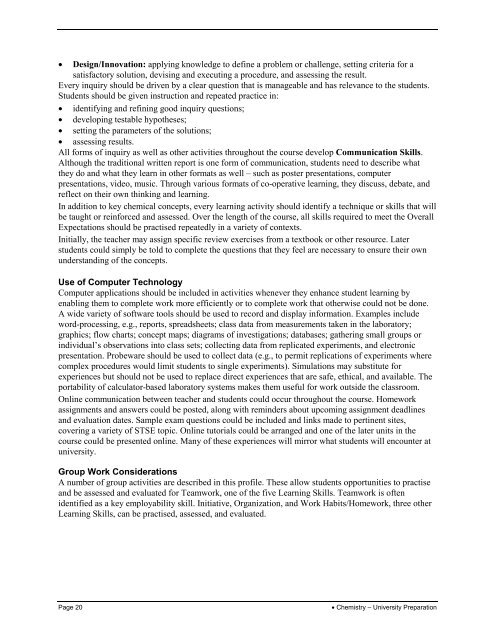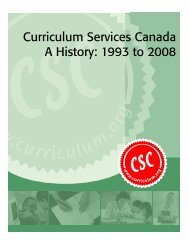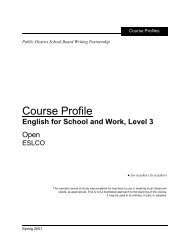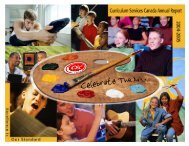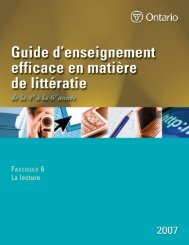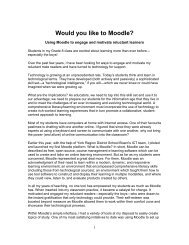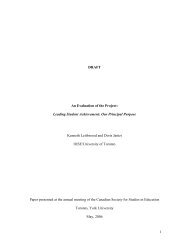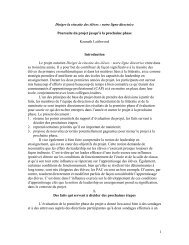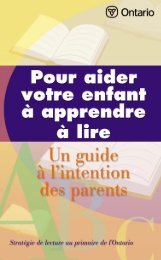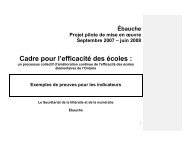Course Profile - Curriculum Services Canada
Course Profile - Curriculum Services Canada
Course Profile - Curriculum Services Canada
Create successful ePaper yourself
Turn your PDF publications into a flip-book with our unique Google optimized e-Paper software.
• Design/Innovation: applying knowledge to define a problem or challenge, setting criteria for a<br />
satisfactory solution, devising and executing a procedure, and assessing the result.<br />
Every inquiry should be driven by a clear question that is manageable and has relevance to the students.<br />
Students should be given instruction and repeated practice in:<br />
• identifying and refining good inquiry questions;<br />
• developing testable hypotheses;<br />
• setting the parameters of the solutions;<br />
• assessing results.<br />
All forms of inquiry as well as other activities throughout the course develop Communication Skills.<br />
Although the traditional written report is one form of communication, students need to describe what<br />
they do and what they learn in other formats as well – such as poster presentations, computer<br />
presentations, video, music. Through various formats of co-operative learning, they discuss, debate, and<br />
reflect on their own thinking and learning.<br />
In addition to key chemical concepts, every learning activity should identify a technique or skills that will<br />
be taught or reinforced and assessed. Over the length of the course, all skills required to meet the Overall<br />
Expectations should be practised repeatedly in a variety of contexts.<br />
Initially, the teacher may assign specific review exercises from a textbook or other resource. Later<br />
students could simply be told to complete the questions that they feel are necessary to ensure their own<br />
understanding of the concepts.<br />
Use of Computer Technology<br />
Computer applications should be included in activities whenever they enhance student learning by<br />
enabling them to complete work more efficiently or to complete work that otherwise could not be done.<br />
A wide variety of software tools should be used to record and display information. Examples include<br />
word-processing, e.g., reports, spreadsheets; class data from measurements taken in the laboratory;<br />
graphics; flow charts; concept maps; diagrams of investigations; databases; gathering small groups or<br />
individual’s observations into class sets; collecting data from replicated experiments, and electronic<br />
presentation. Probeware should be used to collect data (e.g., to permit replications of experiments where<br />
complex procedures would limit students to single experiments). Simulations may substitute for<br />
experiences but should not be used to replace direct experiences that are safe, ethical, and available. The<br />
portability of calculator-based laboratory systems makes them useful for work outside the classroom.<br />
Online communication between teacher and students could occur throughout the course. Homework<br />
assignments and answers could be posted, along with reminders about upcoming assignment deadlines<br />
and evaluation dates. Sample exam questions could be included and links made to pertinent sites,<br />
covering a variety of STSE topic. Online tutorials could be arranged and one of the later units in the<br />
course could be presented online. Many of these experiences will mirror what students will encounter at<br />
university.<br />
Group Work Considerations<br />
A number of group activities are described in this profile. These allow students opportunities to practise<br />
and be assessed and evaluated for Teamwork, one of the five Learning Skills. Teamwork is often<br />
identified as a key employability skill. Initiative, Organization, and Work Habits/Homework, three other<br />
Learning Skills, can be practised, assessed, and evaluated.<br />
Page 20<br />
• Chemistry – University Preparation


